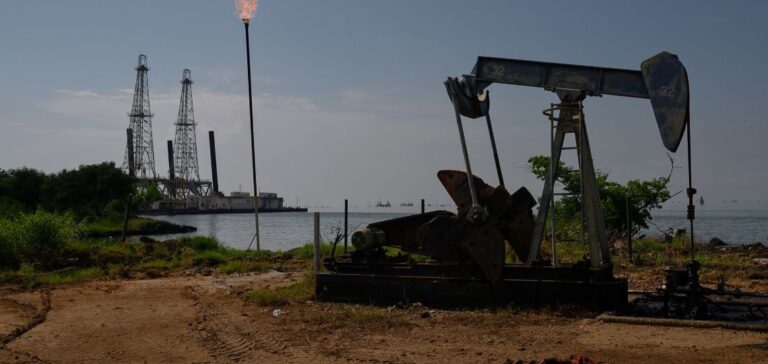The United States has revoked the licences previously granted to several foreign oil groups operating in Venezuela, intensifying its economic pressure campaign against President Nicolás Maduro. This decision, made official in March, targets the operations of American company Chevron, Spanish group Repsol, and French firm Maurel & Prom, which must cease all activity in the country by 27 May. The measure forms part of a broader policy by the Trump administration to delegitimise Maduro’s 2024 re-election, deemed fraudulent by parts of the international community.
Washington has also announced a 25% tariff on oil imports from countries doing business with Caracas. This effectively ends a period of relative operational stability made possible by waivers issued in late 2022, which allowed the state-owned Petróleos de Venezuela S.A. (PDVSA) to rehabilitate part of its infrastructure and partially revive production.
Maintained production under threat
Venezuela’s current oil output stands at approximately 900,000 barrels per day, according to the Organisation of the Petroleum Exporting Countries (OPEC). This level was achieved after the restart of several oil fields operated through joint ventures with foreign partners, notably Chevron (220,000 barrels), Repsol (60,000), and Maurel & Prom (up to 25,000). Despite their exit, field operations are expected to continue, as these are co-owned with PDVSA.
Gilberto Morillo, former Chief Financial Officer of PDVSA, believes the company now holds a certain level of operational capacity, although the extent remains unclear. Nevertheless, the withdrawal of technical and logistical support from foreign partners could disrupt activities, particularly in areas reliant on external expertise and equipment.
Crude sales and logistical barriers
From a commercial standpoint, sanctions create a major hurdle. Venezuela, which in February exported 500,000 barrels per day to China, 240,000 to the United States, and 70,000 to India and Spain, will now have to bypass restrictions by relying on intermediaries. Such practices were previously employed during past sanctions phases, often resulting in significant price discounts.
Attempts to sell oil via crypto-assets were suspended following a corruption scandal involving former Oil Minister Tareck El Aissami, who was accused of embezzling up to USD15bn. Reinaldo Quintero, President of the Venezuelan Petroleum Association, acknowledged the threat these sanctions pose to Venezuelan crude exportability, while also suggesting the possibility of new negotiation channels.
Domestic energy and macroeconomic impact
Repsol, which has a significant presence in the Venezuelan gas sector, stated that 85% of its local operations involve natural gas, which is essential for the country’s electricity grid. The prohibition on receiving payments in US dollars forces companies to consider continuing operations without immediate compensation. Morillo noted that if PDVSA is unable to pay its partners, they may either accumulate debt or withdraw from the country, abandoning their investments.
The announcement of US measures immediately triggered a surge in the black market dollar rate. According to consultant César Aristimuño, this reflects fears of a return to hyperinflation and shortages, in a country whose gross domestic product declined by 80% between 2014 and 2021. The prevailing uncertainty has raised concerns over Venezuela’s economic resilience in the face of mounting isolation.





















